Northern Ireland: Can Protestant and Catholic workers unite?
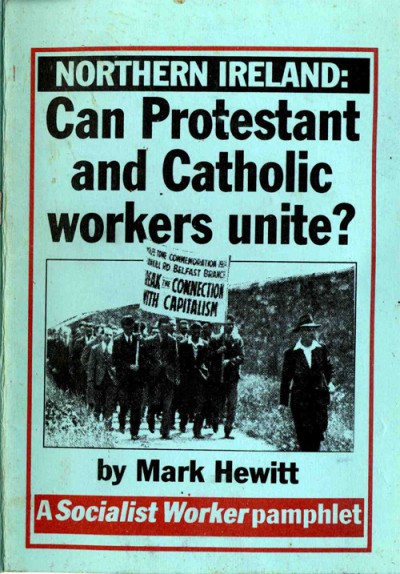
| Date: | July 1993 |
|---|---|
| Organisation: | Socialist Workers' Movement |
| Author: | Mark Hewitt |
| View: | View Document |
| Discuss: | Comments on this document |
| Subjects: |
Please note: The Irish Left Archive is provided as a non-commercial historical resource, open to all, and has reproduced this document as an accessible digital reference. Copyright remains with its original authors. If used on other sites, we would appreciate a link back and reference to The Irish Left Archive, in addition to the original creators. For re-publication, commercial, or other uses, please contact the original owners. If documents provided to The Irish Left Archive have been created for or added to other online archives, please inform us so sources can be credited.
Commentary From The Cedar Lounge Revolution
10th May 2010
This pamphlet, printed in July 1993, provides a snapshot of the Socialist Workers Movement attitude during a pivotal time in the North, a point where the Peace Process had started.
It’s a simply designed document, with the typical rather stark appearance of many SWM/SWP printed materials from the same period. A style, which whatever about that starkness, has the genuine virtue of being immediately identifiable.
The pamphlet takes the reader through the history of the conflict, starting with ‘Why is there sectarianism in Northern Ireland’, considering ‘Republicanism’, ‘Labourism in Northern Ireland’ and concluding with the ‘Socialist Alternative’.
The listing of various events where Protestant and Catholic workers made common cause is as one would expect. There are some oddities in the text. As was noted to me the date of the Plantations on page one is incorrect.
It provides a rather narrow analysis of the events of 1969 and suggests that ‘Prior to 1969, the IRA was a tiny force. According to one writer, Boyer Bell, the Belfast IRA in 1969 had ‘only a few active scattered volunteers, a collection of veteran republicans in reserve and almost no arms’.
Given the critical support formerly given to the Provisional IRA by the SWM in Ireland and the SWP in Britain it is notable that there is a certain coolness in the treatment of that political area. Therefore we read that ‘Even when Sinn Fein was going through its left phase it argued that the fight for socialism had to be postponed until the distant future’ and that ‘The fall of Eastern Europe in 1989 has brought about a change in political perspective in many nationalist movements across the world. Up to then groups like the IRA, the PLO, the ANC often adopted a left rhetoric. Their goal was always for their community or nation to join the world system as political equals. But they saw the USSR as representing the ‘socialist bloc’ in that system. When that regime collapsed they often decided that since there was only one superpower in existence they would have to come to terms with US imperialism’.
And…
This has led many nationalist movements to drop their left rhetoric. Instead they now seek to press for a ‘social contract’ in their respective countries…. The nationalist grouping work actively to try to demobilise workers struggle.
It continues…
Something of a similar process is at work in Ireland. Since the 1990s, the republicans rarely talk about socialism. Their aim is now simply to ‘raise the nationalist agenda’… All this shows that republicanism can never be considered a vehicle for bringing about a socialist Ireland’.
A useful contrast with previous documents from the SWM.
More from Socialist Workers' Movement
Socialist Workers' Movement in the archive
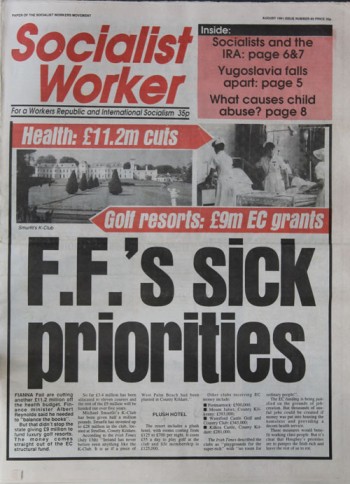
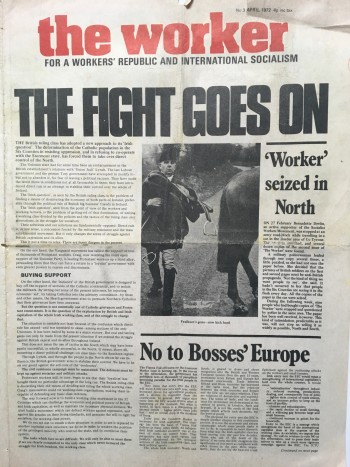
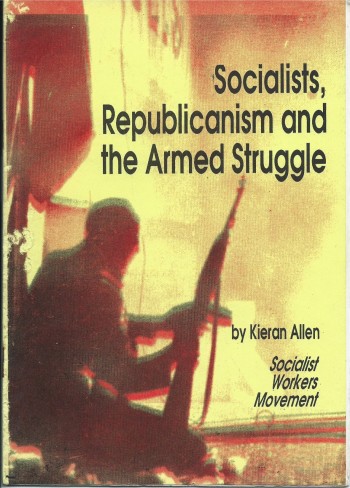
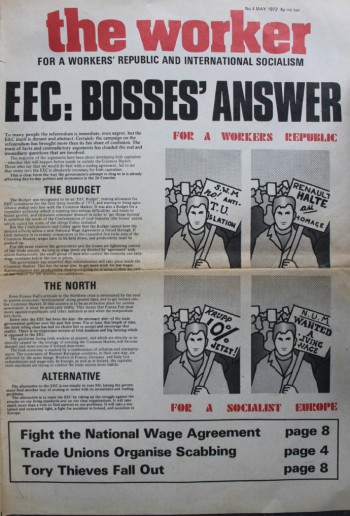
Comments
No Comments yet.
Add a Comment
Comments can be formatted in Markdown format . Use the toolbar to apply the correct syntax to your comment. The basic formats are:
**Bold text**
Bold text
_Italic text_
Italic text
[A link](http://www.example.com)
A link
You can join this discussion on The Cedar Lounge Revolution
By: Budapestkick Mon, 10 May 2010 14:27:08
I disagree with the idea that the pre-69 IRA was a tiny force. It had c.1300 members, was growing and was considered a serious threat by both the Northern and Southern authorities.
Reply on the CLR
By: Mark P Mon, 10 May 2010 15:56:20
That’s an interesting pamphlet, more as a picture of a moment in time in the evolution of the SWP than for the actual contents. It’s from a period when the politics of the SWM/P on the national question were in transition.
Back in the 1970s and 1980s they had a much more left republican approach. They weren’t uncritical cheerleaders for the Provisionals, as some left groups were, but they were firmly in the left-republican camp overall. They would call for a vote for SF, for instance. They laid heavy emphasis on defending the Provisionals right to blow stuff up, and repeatedly argued in the 1970s that the central problem with the “military campaign” was that it wasn’t harnessed to socialist political aims. Their attitude towards working class unity was also very different to the one presented in this pamphlet – their 1980s approach was that “sections” of Protestant workers could be won over but only after Catholic workers in the North had united with Southern workers.
By the 2000s they were making arguments against individual terrorism which could have been reprints from Militant circa 1974 and had long dropped the call for votes for SF. They laid a much greater emphasis on the need for unity beween Protestant and Catholic workers and had dropped almost all of the left republican trappings. By the time of this pamphlet they had already moved much of the way there.
There are some other things worth noting about the pamphlet. Firstly, its author is, if I recall correctly, one of the people who split from the SWP recently to establish the International Socialists (basically the old Belfast branch of the SWP). And if you go down the list of sister organisations on the back cover, quite a few of them have, for one reason or another, split away or been expelled over the years.
And finally their criticisms of the Provisionals for “moving to the right” and dropping talk about socialism have some force, but are a little amusing in this age of People Before Profit. In fact their 1990s documents more generally are a treasure trove of hostages to fortune about the dangers of dropping explicitly socialist arguments and the risk of electoral engagement dragging socialists to the right.
Reply on the CLR